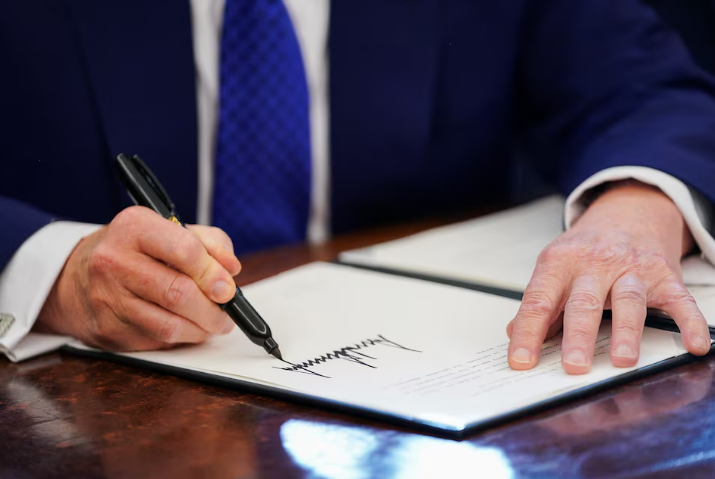U.S. President Donald Trump’s approval rating has ticked slightly lower in recent days as more Americans worried about the direction of the U.S. economy as the new leader threatens a host of countries with tariffs, a Reuters/Ipsos poll found.
The six-day poll, which closed on Tuesday, showed 44% of respondents approved of the job Trump is doing as president, down from 45% in a Reuters/Ipsos poll conducted January 24-26. Trump’s approval rating stood at 47% in a January 20-21 poll conducted in the hours after the Republican’s return to the White House.

The share of Americans who disapprove of his presidency has risen more substantially, to 51% in the latest poll, compared with 41% right after he took office.
Trump enjoys a relatively high rate of approval on his immigration policy, with 47% of respondents backing his approach that has included promises to ramp up deportations of migrants in the country illegally. The share was little changed from January.

But the share of Americans who think the economy is on the wrong track rose to 53% in the latest poll from 43% in the January 24-26 poll. Public approval of Trump’s economic stewardship fell to 39% from 43% in the prior poll.
A pillar of Trump’s political strength has been public belief that his policies will be good for the economy, and his rating on the economy remains significantly higher than the final readings of his predecessor in office, Democrat Joe Biden, who ended his term with a 34% approval rating on the economy. But Trump’s rating for the economy is well below the 53% he had in Reuters/Ipsos polling conducted in February 2017, the first full month of his first term as U.S. president.

In the latest poll, only 32% of respondents approved of Trump’s performance on inflation, a potential early sign of disappointment in the Republican’s performance on a core economic issue after several years of rising prices weakened Biden ahead of last year’s presidential election. Trump defeated Biden’s vice president, Kamala Harris, in the Electoral College and narrowly won the popular vote.
A recent report from the U.S. Labor Department showed consumer prices rose by the most in nearly 1-1/2 years in January, with Americans facing higher costs for a range of goods and services. Other economic data has shown U.S. households expect inflation to pick up following Trump’s February 1 announcements for steep tariffs on imports from China, Mexico and Canada.
While the levies on Mexico and Canada were since delayed until March, Trump has set March 12 as the start date for other tariffs on imported steel and aluminum and he has directed his staff to devise global reciprocal tariffs.
Tracking Trump 2.0
Presidential approval polls
The state of the Trump economy
Fifty-four percent of respondents in the latest Reuters/Ipsos poll said they opposed new tariffs on imported goods from other countries, while 41% were in favor of them. Increasing tariffs on Chinese goods had higher levels of support, with 49% in favor and 47% against.
The Reuters/Ipsos poll, which was conducted online, surveyed 4,145 U.S. adults nationwide and had a margin of error of about 2 percentage points in either direction.